Advanced Motivational Interviewing Report: Counseling Approach Review
VerifiedAdded on 2022/08/15
|5
|1204
|12
Report
AI Summary
This report provides a comprehensive literature review on motivational interviewing (MI) as a counseling approach. It begins with an introduction to MI, outlining its principles, such as expressing empathy, developing discrepancy, adjusting to resistance, and fostering optimism. The report explores MI's application in addressing addiction and health concerns, emphasizing the importance of the interviewer's listening skills and ability to encourage patients. It then examines MI as a counseling approach, highlighting the creation of a comfortable environment and the handling of ambivalence. The report further analyzes the strengths and weaknesses of counseling, offering suggestions for skill improvement. It also delves into counseling philosophies, including Carl Rogers' humanistic theory and Aaron Beck's cognitive theory, and their relevance to MI. The report concludes by providing a list of references.
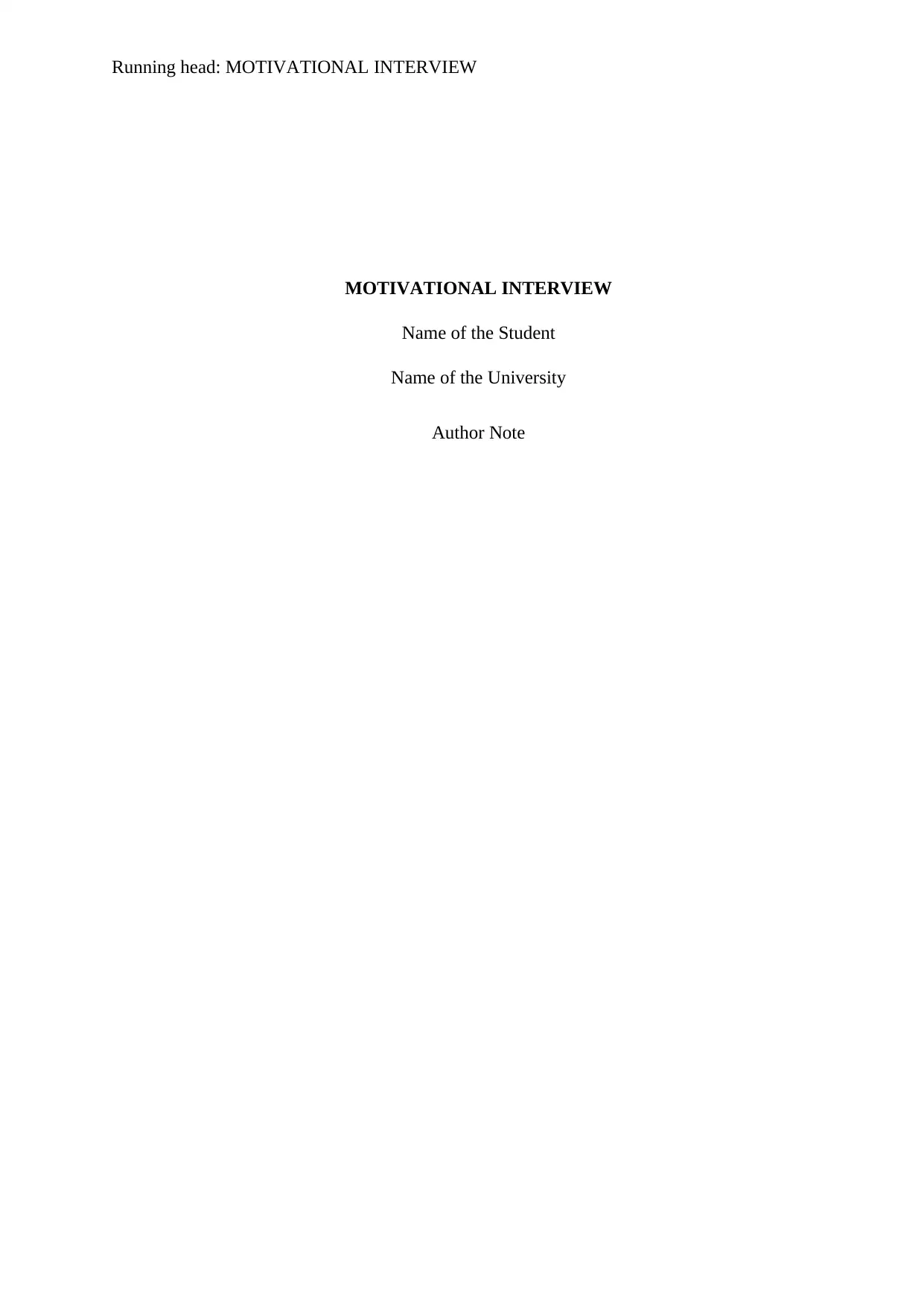
Running head: MOTIVATIONAL INTERVIEW
MOTIVATIONAL INTERVIEW
Name of the Student
Name of the University
Author Note
MOTIVATIONAL INTERVIEW
Name of the Student
Name of the University
Author Note
Paraphrase This Document
Need a fresh take? Get an instant paraphrase of this document with our AI Paraphraser
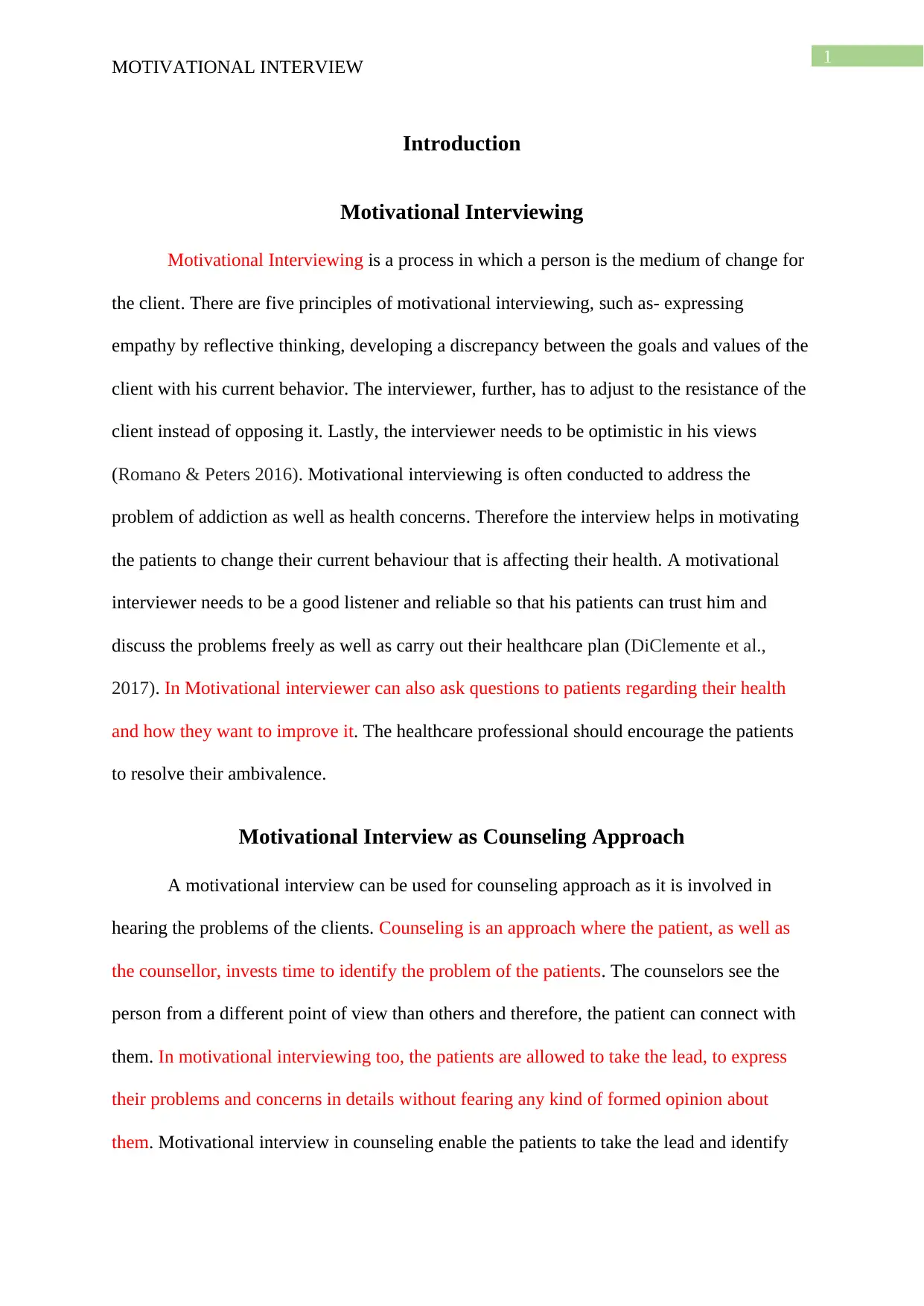
1
MOTIVATIONAL INTERVIEW
Introduction
Motivational Interviewing
Motivational Interviewing is a process in which a person is the medium of change for
the client. There are five principles of motivational interviewing, such as- expressing
empathy by reflective thinking, developing a discrepancy between the goals and values of the
client with his current behavior. The interviewer, further, has to adjust to the resistance of the
client instead of opposing it. Lastly, the interviewer needs to be optimistic in his views
(Romano & Peters 2016). Motivational interviewing is often conducted to address the
problem of addiction as well as health concerns. Therefore the interview helps in motivating
the patients to change their current behaviour that is affecting their health. A motivational
interviewer needs to be a good listener and reliable so that his patients can trust him and
discuss the problems freely as well as carry out their healthcare plan (DiClemente et al.,
2017). In Motivational interviewer can also ask questions to patients regarding their health
and how they want to improve it. The healthcare professional should encourage the patients
to resolve their ambivalence.
Motivational Interview as Counseling Approach
A motivational interview can be used for counseling approach as it is involved in
hearing the problems of the clients. Counseling is an approach where the patient, as well as
the counsellor, invests time to identify the problem of the patients. The counselors see the
person from a different point of view than others and therefore, the patient can connect with
them. In motivational interviewing too, the patients are allowed to take the lead, to express
their problems and concerns in details without fearing any kind of formed opinion about
them. Motivational interview in counseling enable the patients to take the lead and identify
MOTIVATIONAL INTERVIEW
Introduction
Motivational Interviewing
Motivational Interviewing is a process in which a person is the medium of change for
the client. There are five principles of motivational interviewing, such as- expressing
empathy by reflective thinking, developing a discrepancy between the goals and values of the
client with his current behavior. The interviewer, further, has to adjust to the resistance of the
client instead of opposing it. Lastly, the interviewer needs to be optimistic in his views
(Romano & Peters 2016). Motivational interviewing is often conducted to address the
problem of addiction as well as health concerns. Therefore the interview helps in motivating
the patients to change their current behaviour that is affecting their health. A motivational
interviewer needs to be a good listener and reliable so that his patients can trust him and
discuss the problems freely as well as carry out their healthcare plan (DiClemente et al.,
2017). In Motivational interviewer can also ask questions to patients regarding their health
and how they want to improve it. The healthcare professional should encourage the patients
to resolve their ambivalence.
Motivational Interview as Counseling Approach
A motivational interview can be used for counseling approach as it is involved in
hearing the problems of the clients. Counseling is an approach where the patient, as well as
the counsellor, invests time to identify the problem of the patients. The counselors see the
person from a different point of view than others and therefore, the patient can connect with
them. In motivational interviewing too, the patients are allowed to take the lead, to express
their problems and concerns in details without fearing any kind of formed opinion about
them. Motivational interview in counseling enable the patients to take the lead and identify
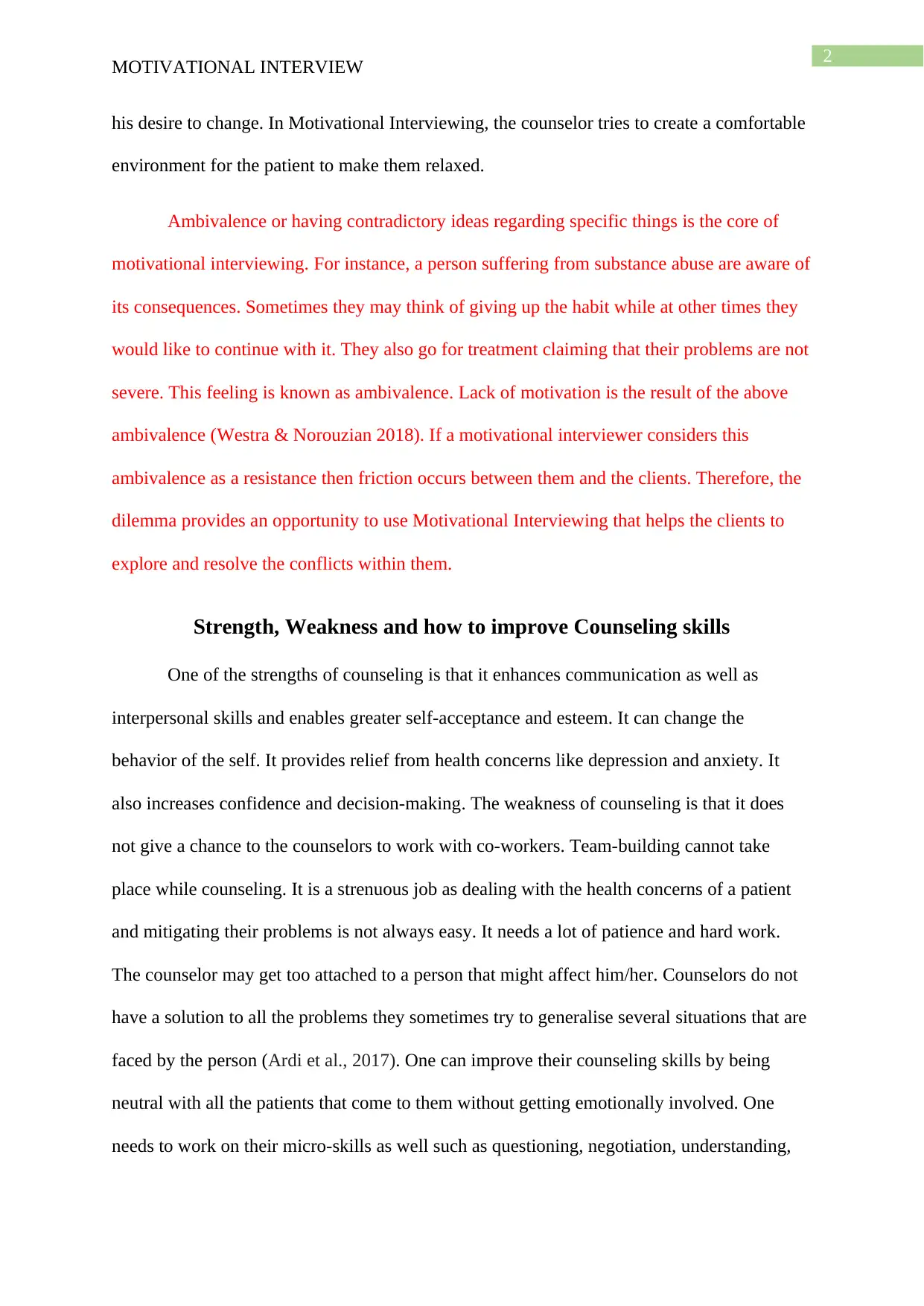
2
MOTIVATIONAL INTERVIEW
his desire to change. In Motivational Interviewing, the counselor tries to create a comfortable
environment for the patient to make them relaxed.
Ambivalence or having contradictory ideas regarding specific things is the core of
motivational interviewing. For instance, a person suffering from substance abuse are aware of
its consequences. Sometimes they may think of giving up the habit while at other times they
would like to continue with it. They also go for treatment claiming that their problems are not
severe. This feeling is known as ambivalence. Lack of motivation is the result of the above
ambivalence (Westra & Norouzian 2018). If a motivational interviewer considers this
ambivalence as a resistance then friction occurs between them and the clients. Therefore, the
dilemma provides an opportunity to use Motivational Interviewing that helps the clients to
explore and resolve the conflicts within them.
Strength, Weakness and how to improve Counseling skills
One of the strengths of counseling is that it enhances communication as well as
interpersonal skills and enables greater self-acceptance and esteem. It can change the
behavior of the self. It provides relief from health concerns like depression and anxiety. It
also increases confidence and decision-making. The weakness of counseling is that it does
not give a chance to the counselors to work with co-workers. Team-building cannot take
place while counseling. It is a strenuous job as dealing with the health concerns of a patient
and mitigating their problems is not always easy. It needs a lot of patience and hard work.
The counselor may get too attached to a person that might affect him/her. Counselors do not
have a solution to all the problems they sometimes try to generalise several situations that are
faced by the person (Ardi et al., 2017). One can improve their counseling skills by being
neutral with all the patients that come to them without getting emotionally involved. One
needs to work on their micro-skills as well such as questioning, negotiation, understanding,
MOTIVATIONAL INTERVIEW
his desire to change. In Motivational Interviewing, the counselor tries to create a comfortable
environment for the patient to make them relaxed.
Ambivalence or having contradictory ideas regarding specific things is the core of
motivational interviewing. For instance, a person suffering from substance abuse are aware of
its consequences. Sometimes they may think of giving up the habit while at other times they
would like to continue with it. They also go for treatment claiming that their problems are not
severe. This feeling is known as ambivalence. Lack of motivation is the result of the above
ambivalence (Westra & Norouzian 2018). If a motivational interviewer considers this
ambivalence as a resistance then friction occurs between them and the clients. Therefore, the
dilemma provides an opportunity to use Motivational Interviewing that helps the clients to
explore and resolve the conflicts within them.
Strength, Weakness and how to improve Counseling skills
One of the strengths of counseling is that it enhances communication as well as
interpersonal skills and enables greater self-acceptance and esteem. It can change the
behavior of the self. It provides relief from health concerns like depression and anxiety. It
also increases confidence and decision-making. The weakness of counseling is that it does
not give a chance to the counselors to work with co-workers. Team-building cannot take
place while counseling. It is a strenuous job as dealing with the health concerns of a patient
and mitigating their problems is not always easy. It needs a lot of patience and hard work.
The counselor may get too attached to a person that might affect him/her. Counselors do not
have a solution to all the problems they sometimes try to generalise several situations that are
faced by the person (Ardi et al., 2017). One can improve their counseling skills by being
neutral with all the patients that come to them without getting emotionally involved. One
needs to work on their micro-skills as well such as questioning, negotiation, understanding,
⊘ This is a preview!⊘
Do you want full access?
Subscribe today to unlock all pages.

Trusted by 1+ million students worldwide
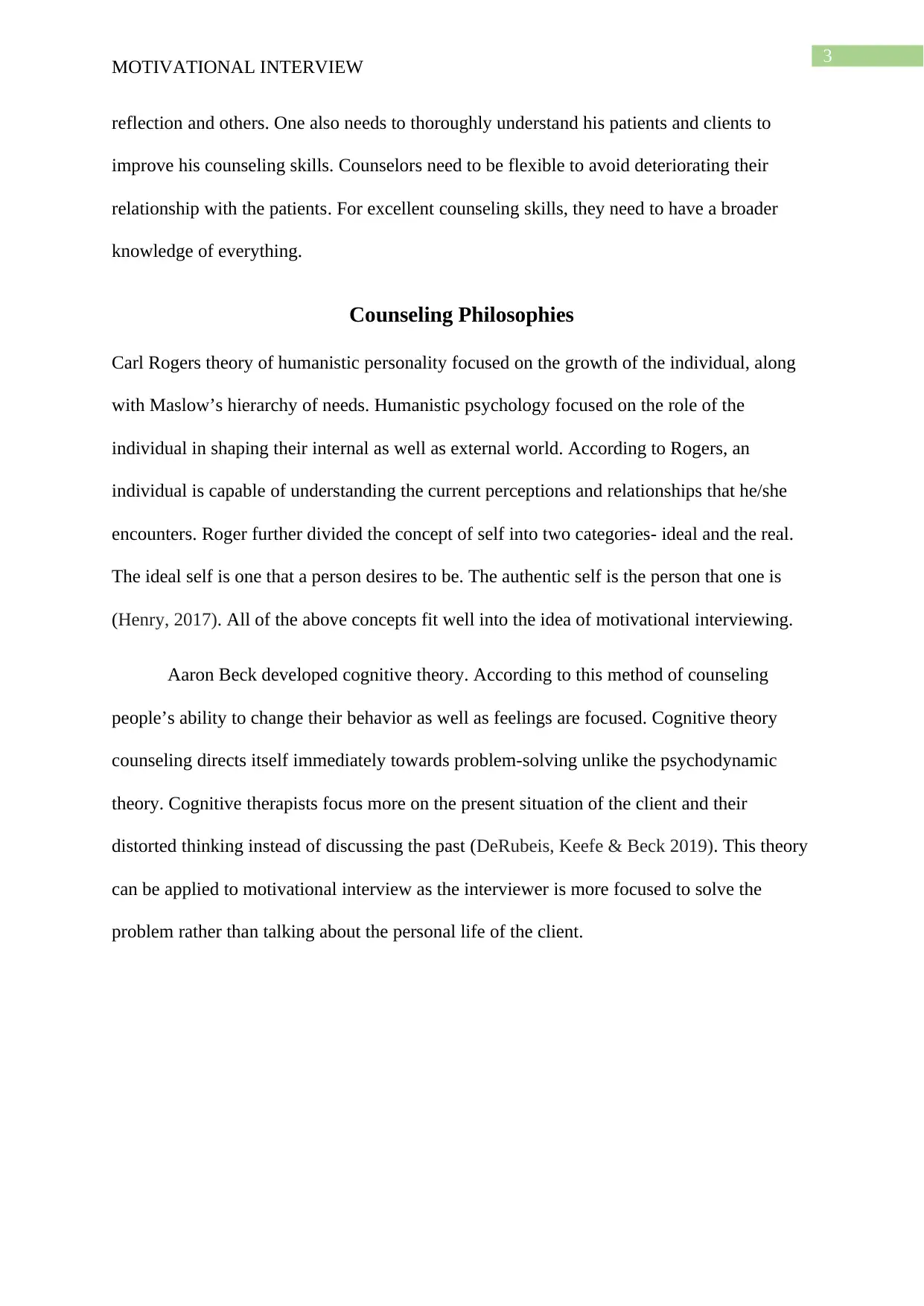
3
MOTIVATIONAL INTERVIEW
reflection and others. One also needs to thoroughly understand his patients and clients to
improve his counseling skills. Counselors need to be flexible to avoid deteriorating their
relationship with the patients. For excellent counseling skills, they need to have a broader
knowledge of everything.
Counseling Philosophies
Carl Rogers theory of humanistic personality focused on the growth of the individual, along
with Maslow’s hierarchy of needs. Humanistic psychology focused on the role of the
individual in shaping their internal as well as external world. According to Rogers, an
individual is capable of understanding the current perceptions and relationships that he/she
encounters. Roger further divided the concept of self into two categories- ideal and the real.
The ideal self is one that a person desires to be. The authentic self is the person that one is
(Henry, 2017). All of the above concepts fit well into the idea of motivational interviewing.
Aaron Beck developed cognitive theory. According to this method of counseling
people’s ability to change their behavior as well as feelings are focused. Cognitive theory
counseling directs itself immediately towards problem-solving unlike the psychodynamic
theory. Cognitive therapists focus more on the present situation of the client and their
distorted thinking instead of discussing the past (DeRubeis, Keefe & Beck 2019). This theory
can be applied to motivational interview as the interviewer is more focused to solve the
problem rather than talking about the personal life of the client.
MOTIVATIONAL INTERVIEW
reflection and others. One also needs to thoroughly understand his patients and clients to
improve his counseling skills. Counselors need to be flexible to avoid deteriorating their
relationship with the patients. For excellent counseling skills, they need to have a broader
knowledge of everything.
Counseling Philosophies
Carl Rogers theory of humanistic personality focused on the growth of the individual, along
with Maslow’s hierarchy of needs. Humanistic psychology focused on the role of the
individual in shaping their internal as well as external world. According to Rogers, an
individual is capable of understanding the current perceptions and relationships that he/she
encounters. Roger further divided the concept of self into two categories- ideal and the real.
The ideal self is one that a person desires to be. The authentic self is the person that one is
(Henry, 2017). All of the above concepts fit well into the idea of motivational interviewing.
Aaron Beck developed cognitive theory. According to this method of counseling
people’s ability to change their behavior as well as feelings are focused. Cognitive theory
counseling directs itself immediately towards problem-solving unlike the psychodynamic
theory. Cognitive therapists focus more on the present situation of the client and their
distorted thinking instead of discussing the past (DeRubeis, Keefe & Beck 2019). This theory
can be applied to motivational interview as the interviewer is more focused to solve the
problem rather than talking about the personal life of the client.
Paraphrase This Document
Need a fresh take? Get an instant paraphrase of this document with our AI Paraphraser
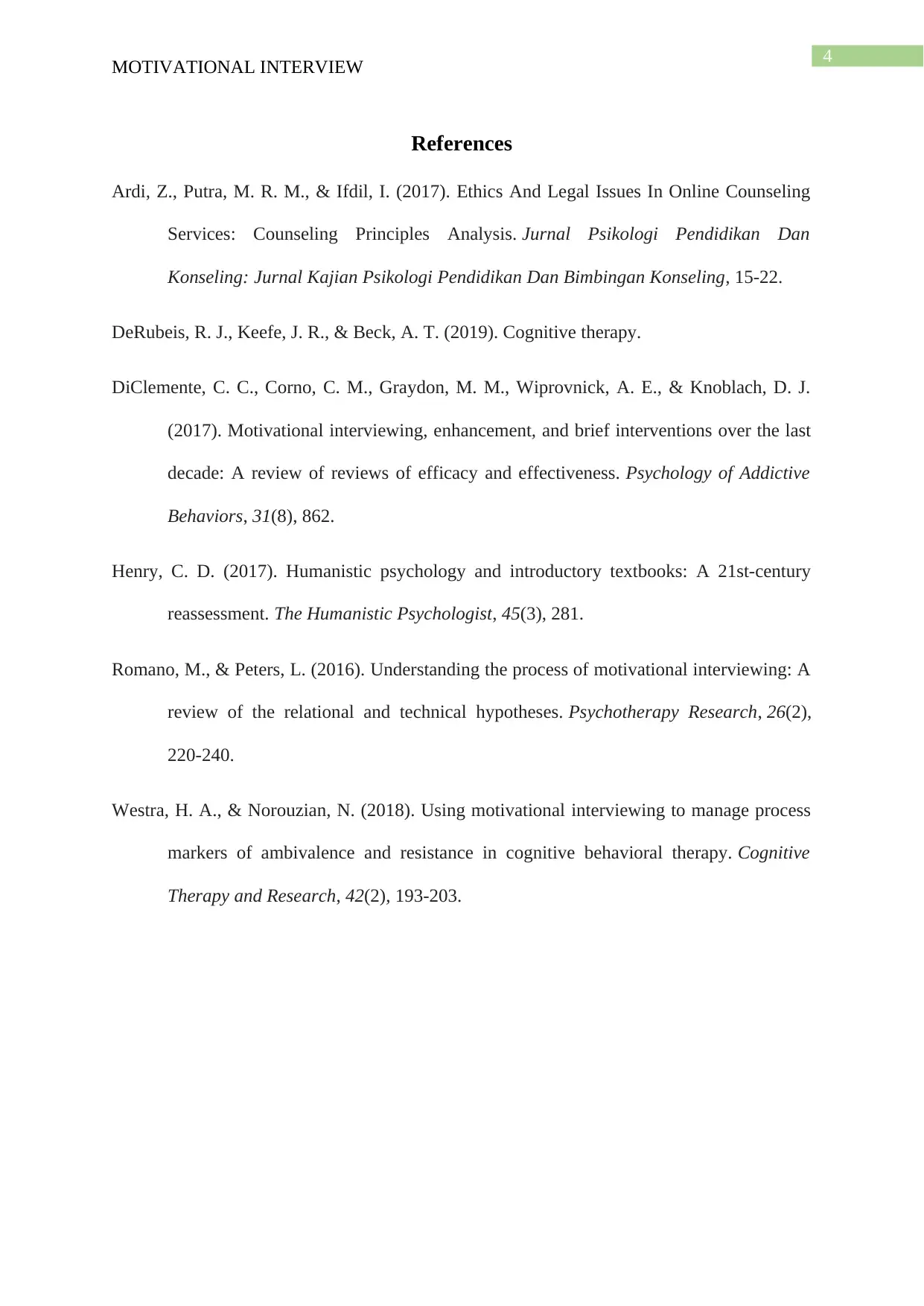
4
MOTIVATIONAL INTERVIEW
References
Ardi, Z., Putra, M. R. M., & Ifdil, I. (2017). Ethics And Legal Issues In Online Counseling
Services: Counseling Principles Analysis. Jurnal Psikologi Pendidikan Dan
Konseling: Jurnal Kajian Psikologi Pendidikan Dan Bimbingan Konseling, 15-22.
DeRubeis, R. J., Keefe, J. R., & Beck, A. T. (2019). Cognitive therapy.
DiClemente, C. C., Corno, C. M., Graydon, M. M., Wiprovnick, A. E., & Knoblach, D. J.
(2017). Motivational interviewing, enhancement, and brief interventions over the last
decade: A review of reviews of efficacy and effectiveness. Psychology of Addictive
Behaviors, 31(8), 862.
Henry, C. D. (2017). Humanistic psychology and introductory textbooks: A 21st-century
reassessment. The Humanistic Psychologist, 45(3), 281.
Romano, M., & Peters, L. (2016). Understanding the process of motivational interviewing: A
review of the relational and technical hypotheses. Psychotherapy Research, 26(2),
220-240.
Westra, H. A., & Norouzian, N. (2018). Using motivational interviewing to manage process
markers of ambivalence and resistance in cognitive behavioral therapy. Cognitive
Therapy and Research, 42(2), 193-203.
MOTIVATIONAL INTERVIEW
References
Ardi, Z., Putra, M. R. M., & Ifdil, I. (2017). Ethics And Legal Issues In Online Counseling
Services: Counseling Principles Analysis. Jurnal Psikologi Pendidikan Dan
Konseling: Jurnal Kajian Psikologi Pendidikan Dan Bimbingan Konseling, 15-22.
DeRubeis, R. J., Keefe, J. R., & Beck, A. T. (2019). Cognitive therapy.
DiClemente, C. C., Corno, C. M., Graydon, M. M., Wiprovnick, A. E., & Knoblach, D. J.
(2017). Motivational interviewing, enhancement, and brief interventions over the last
decade: A review of reviews of efficacy and effectiveness. Psychology of Addictive
Behaviors, 31(8), 862.
Henry, C. D. (2017). Humanistic psychology and introductory textbooks: A 21st-century
reassessment. The Humanistic Psychologist, 45(3), 281.
Romano, M., & Peters, L. (2016). Understanding the process of motivational interviewing: A
review of the relational and technical hypotheses. Psychotherapy Research, 26(2),
220-240.
Westra, H. A., & Norouzian, N. (2018). Using motivational interviewing to manage process
markers of ambivalence and resistance in cognitive behavioral therapy. Cognitive
Therapy and Research, 42(2), 193-203.
1 out of 5
Related Documents
Your All-in-One AI-Powered Toolkit for Academic Success.
+13062052269
info@desklib.com
Available 24*7 on WhatsApp / Email
![[object Object]](/_next/static/media/star-bottom.7253800d.svg)
Unlock your academic potential
Copyright © 2020–2026 A2Z Services. All Rights Reserved. Developed and managed by ZUCOL.





